How Professional Tenant Screening Reduces Risk for Landlords

One of the keys to owning profitable rental properties is proper tenant selection. Dealing with bad renters can jeopardize your real estate investments more than lengthy vacancy times. Good ones can keep their end of the bargain — pay full rent on time, respect the property and be positive community members. Any landlord can narrow down the list to a few candidates. However, letting a professional tenant screening program do the heavy lifting is more efficient and yields more impartial outcomes. Collecting Accurate Data Tech-forward property managers work with software providers to develop automated programs optimized for scouring all available information about prospective tenants, compiling truthful applicant data and quickly generating reports. Boom is an excellent example. Mark Brower Properties has teamed up with this rental financial services provider to develop a resident screening software platform. This solution has configurable application templates, allowing us to pick and choose which data sources to incorporate into tenant underwriting and quantify the risks associated with every applicant. Such capability enables us to glean insights from accurate data, giving us a more complete picture of applicants and reducing our blindspots when making decisions. In turn, it augments our fraud risk reduction efforts in the rental properties we manage. Leveraging this advanced technology gives us the confidence to assess which applicants pose the risk of default on lease agreements. Aside from relying on aggregators of renter data vendors, property management companies run credit and criminal background checks, evaluate rental history, verify income and request personal references. Property managers may also use comprehensive application forms to obtain more personal details. Automating Application Approval Professional tenant screening minimizes direct human involvement in the rental application approval process by design. It expedites the vetting process and helps prevent prejudice. Although algorithmic bias exists, developers exclude variables that may result in discriminatory decisions from the equation. This tech-based approach evaluates candidates based on a hierarchy of factors. Each has a relative weight, allowing the considerations property managers deem more relevant to them to influence the algorithm’s decision more than those of less relevant ones. For instance, credible property management companies like Mark Brower Properties put more weight on missed rental payments and eviction records than credit utilization rates and medical debt collections. This concept resembles the mindsets of mortgage lenders and insurance carriers when using credit scoring models. Various parties could look at the same credit reports about a consumer and score the person differently, but algorithms follow the same criteria every time. This way, property managers and landlords can expect the tenant screening process to paint a unified story for every rental applicant in a predictable manner. Applicants from all walks of life can seek housing on an equal footing, laying the foundation for merit-based decision-making. As impartial as algorithms can be, developers can’t code critical thinking. Sometimes, human intervention is necessary to judge some components of tenant screening reports accordingly. Property management professionals have domain expertise to assess rental, eviction, employment and criminal histories contextually on a case-by-case basis to avoid erroneously rejecting reliable tenants who have been victims of circumstance. For example, a lifelong, upstanding renter with a decent income who was jobless during the pandemic may be a better candidate than a deep-pocketed individual with unverifiable income streams and no prior rental history. Ensuring Legal Compliance Self-managing landlords often make the cardinal tenant screening mistake of manually analyzing data. You can play favorites and select tenants that align with your long-term business goals. However, you may inadvertently commit discriminatory practices when denying applicants without deeply understanding the Fair Housing Act and relevant landlord-tenant laws. A property management company uses professional tenant screening to identify applicants with a prior property crime conviction, protecting your investments from potential repeat offenders while observing regulatory compliance. Its legal team ensures it can reject less-than-desirable tenants without violating anyone’s fair housing rights. Violating a person’s fair housing rights comes with five- or six-digit civil penalties, severely impacting your cash flow. Moreover, it can earn you a bad reputation that can follow you for a long time. Impartial algorithms help ensure legal compliance in tenant screening. Landlords and property managers can enjoy plausible deniability in civil lawsuits. You can mount a better defense in court when automated programs engineered not to see race, religion, sex, disability, familial status and national origin primarily vet applicants instead of humans who are prone to cognitive biases. Regardless of the number of doors you own, using a property manager is worth it to protect yourself from the legal and financial headaches stemming from poor tenant selection, such as racial discrimination claims, unpaid rent, intentional property damage and eviction costs. Such an expert turns to algorithms to screen tenants with legal compliance in mind, upholding fairness and minimizing biases. Keeping Turnover Manageable Reputable property managers prioritize long-term tenancy. Although vacancy is inevitable, professional tenant screening helps ensure it seldom happens and moves qualified replacements into your rentals in no time. Unfortunately, many property managers have one-sided fee structures to benefit from landlord losses. Use a company with a fee structure that aligns its incentives with those of real estate investors — like Mark Brower Properties. The fact that we don’t pocket 100% of late fees means we never get a massive bonus by approving marginal residents who routinely pay late. Considering we set reasonable management fees and modest maintenance markups, our fee structure promotes long-term tenancy and disincentivizes turnover. Furthermore, we use a three-tier approach to tenant selection to keep occupancy rates high and minimize turnover. Our top-tier applicants can rent the specific unit they want without a guarantor. Those in the middle tier can pass with a strong guarantor, and the candidates in the bottom tier get denied even if they involve a strong guarantee in the agreement. Our three-tier approach is a bold departure from the typical, shortsighted industry practice of giving a thumbs up to anybody with a reliable guarantor. It also speaks volumes about our commitment to accountability —
How Much Do Property Managers Charge? A Complete Guide for Phoenix Landlords

Property management fees can feel like navigating a complex maze, especially for landlords in the Greater Phoenix area who are considering professional management for the first time. Whether you’re wondering about the cost of a property manager or trying to understand rental management pricing, this guide will help you make an informed decision about your investment property. Understanding Property Management Fees The rental management pricing structure in Phoenix varies significantly among companies, with some opting for straightforward pricing while others employ more complex fee arrangements. The core monthly property management fee can range widely from a flat rate of $75-99 monthly to a percentage-based fee of 8-20% of monthly rent or a hybrid, like we charge at https://markrent.com/property-management-fees/. However, this base fee is just the beginning of understanding the total cost of property management services. Most property managers layer additional charges beyond their base management fee: Leasing fees, typically ranging from 50-100% of one month’s rent, compensate managers for marketing your property and securing quality tenants. Lease renewal fees, usually between $200-500, cover the administrative work of extending existing tenant agreements. For larger maintenance projects exceeding $1,000, many managers charge a project management fee of 10-15% to coordinate and oversee the work. Hidden Costs and Additional Fees When researching how much property managers charge, it’s crucial to look beyond the advertised rates. Many companies generate significant revenue through auxiliary fees charged to both owners and tenants. Owner-specific charges might include property inspection fees ($70-125 per occurrence), annual accounting fees, and document retention costs. Tenant-related fees often include application processing charges, pet rent, security deposit alternatives, and various administrative fees including move-in and lease renewal admin fees. The structure of these fees reveals much about a management company’s business model and priorities. Companies that derive most of their revenue from tenant fees rather than management fees may be incentivized to maintain higher turnover rates or impose excessive charges on residents. This approach often leads to shorter tenancies and increased vacancy rates, ultimately affecting your bottom line. The Value of Professional Property Management The true cost of property management extends beyond the fee structure. A professional property manager should serve as a strategic partner in your real estate investment, providing value that exceeds their fees through superior tenant screening and retention strategies that reduce vacancy rates and minimize payment issues. Professional managers typically have refined screening processes and marketing capabilities that help secure higher-quality, longer-term tenants. Maintenance cost control through established vendor relationships and preventive maintenance programs. While managers may charge oversight fees for larger projects, their vendor networks often provide competitive pricing and reliable service. Legal compliance management that helps avoid costly mistakes in an increasingly complex regulatory environment. This becomes particularly valuable in markets like Phoenix, where rental laws continue to evolve. Choosing the Right Property Management Partner When evaluating property management fees, consider companies that demonstrate transparency in their fee structure and show a clear alignment with owner interests. The best managers typically share late fees with owners (often 50/50), maintain reasonable renewal fees to encourage tenant retention, and apply maintenance markups only to larger projects requiring significant coordination. Wondering if Property Management Fees Are Worth It? Read On. Rather than overwhelming you with a lengthy checklist, here are the five most critical actions to take when evaluating whether the property management fees are a worthwhile investment for you: Calculate your true current costs, including the value of your time spent on property management tasks. Be realistic here. Most DIY landlords think they spend less than an hour per month managing their property when in reality they spend at least 40 hours per year. Request detailed fee schedules from three local property managers, ensuring you understand all potential charges. Verify their tenant screening process and average tenant retention rates. Review their maintenance handling procedures and associated fees. Review the company’s Yelp reviews. Why Yelp? Yelp makes it nearly impossible for a company to manipulate its online reputation. Reading Yelp reviews is nearly as good as talking with client references. Check out our Yelp reviews here! Making the Final Decision The decision to hire a property manager ultimately depends on your specific situation. Professional management makes sense if you value your time, want truly passive income, or manage multiple properties. It might not be the right choice if you need complete control over all aspects of your rental business or genuinely enjoy hands-on property management. Consider that while property management fees represent an added expense, the cost of self-management mistakes can be far greater. Many first-time landlords learn this lesson through challenging experiences with problem tenants or maintenance issues that could have been prevented with professional oversight. Conclusion Understanding property management fees is essential for making an informed decision about your rental property’s management. While the initial costs might seem high, professional management often pays for itself through better tenant quality, reduced vacancy rates, and prevention of costly mistakes. The key is finding a manager whose fee structure aligns with your interests and demonstrates a commitment to long-term property care and tenant satisfaction. Remember that in the Phoenix market, the cheapest property management option rarely provides the best value. Focus instead on finding a management partner whose pricing structure reflects a balanced approach to owner returns and tenant satisfaction. With the right property manager, your rental property can truly become a passive investment that generates reliable returns without consuming your time and energy. Lastly, the biggest threat to building wealth through rental property ownership is not usually financial, it is emotional. Partnering with the right property managers can enable you to manage that stress and unlock the tremendous compounding effects of this asset class. Take the next step toward passive investment, contact us or schedule your free consultation today.
How Property Management Companies Handle Emergency Maintenance in Rental Properties

Emergency property management can be chaotic. The urgent nature of the situation leaves no room for error. A single mistake can be costly in more ways than one. Even seasoned landlords can’t always oversee after-hours emergencies well. That’s why discerning real estate investors use property managers to handle emergency maintenance in rentals to ensure everything goes smoothly. How Property Managers Simplify Emergency Maintenance in Rentals If you’re unsure whether to sign a management agreement, consider the vital roles a competent property management team plays in these areas so you can deliver 24/7 rental property maintenance to tenants. Cost Reduction Some emergencies are more destructive than others. However, they all have the potential to negatively impact your finances when not urgently addressed. Handling urgent repairs is racing against time — the sooner you repair the issue, the lesser the loss. For example, a roof leak during a downpour can lead to severe interior water damage when neglected. Water doesn’t mix with many building materials and electric appliances. Damp areas are breeding grounds for mold growth. Expenses can add up quickly, and your restoration cost will skyrocket before you know it. Moreover, your tenants may do more than not renew their leases to penalize you for being nonresponsive to emergency repair calls. Arizona is not a rent strike state, meaning tenants can’t withhold rent when they feel their landlords violate the lease for any reason. However, renters may take matters into their own hands after sending a 10-day notice to repair something, including reimbursing themselves for any DIY repairs by deducting their repair costs from rent. Allowing emergencies to spiral can negatively affect your bottom line since you can’t control how renters approach home projects and choose contractors. Even worse, disgruntled renters may sue and seek compensation for their emotional distress and annoyance. Property managers ensure rapid response for rental property emergencies. They treat pressing matters accordingly to prevent repairs from escalating and minimize losses. Companies like Mark Brower Properties have 24/7 live phone availability for maintenance, so property managers can promptly acknowledge and address tenant needs. Property management companies have a Rolodex of reliable contacts that can deploy a well-equipped crew to manage the situation on speed dial. Granted, you can build a trusted vendor network for maintenance, but establishing long-term relationships with dependable local contractors takes time. Property managers get to screen more vendors and see which ones provide satisfactory service at short notice because they encounter emergencies more frequently than self-managing landlords. Using a property manager to offer tenant emergency services also allows you to prevent undue safety incidents. Prioritizing tenant safety can reduce the need to file future liability claims and keep your insurance rate low. Tenant Safety Many landlords think about home upkeep seasonally. Conversely, property management companies live and breathe rental maintenance daily. Their staff undergoes regular refresher training to assess situations properly, remember property management emergency protocols and execute them seamlessly when necessary. Property managers know their priorities and don’t panic under pressure. They follow the appropriate protocol to advise tenants what to do until help arrives and prevent dire situations — like carbon monoxide leakage — from worsening. Compliance Property management professionals are agile thinkers. They can assess a situation and know what constitutes an emergency when responding to maintenance requests. Implied warranty of habitability is a hallmark of the Arizona Residential Landlord and Tenant law, so any situation rendering rental units unfit to live in is an emergency — such as no air conditioning during the extremely hot Arizona summer months of June, July and August. The line between ordinary and emergency maintenance requests is occasionally thin. Property managers have more experience dealing with unusual situations and may access relevant legal advice more quickly, so they make better judgment calls than individual landlords. Furthermore, it’s not always possible to permanently solve an emergency maintenance request. Some issues simply require more resources and planning. Mitigating losses by applying quick-relief remedies is a tried-and-true strategy to temporarily improve a problem rental’s habitability. For instance, providing affected tenants with portable AC units can mitigate the impact of broken HVAC equipment and give you more time to consider a long-term solution. Similarly, walking tenants through how to find their master shut-off valve and cut their water supply can alleviate flood damage. Mark Brower Properties tags the emergency shut-off valves of the units it manages with visible, durable 3D-printed labels to help tenants spot them easily during stressful situations. Another effective tactic is to empower tenants to mitigate losses through self-help. After all, emergency mitigation rests on the shoulders of both tenants and property owners or managers. In many cases, there’s something renters can do to reduce the impact of emergencies on their quality of life and finances. Experienced property managers remind tenants to store food items in a cooler when their refrigerator breaks, potentially saving them hundreds of dollars worth of groceries. Advising renters to stop using plumbing when the drain lines aren’t working can prevent flooding and safeguard their belongings from water damage. Otherwise, the tenants may share the blame for the damage. A landlord or property manager shouldn’t enter rented premises outside regular business hours. If an issue isn’t an emergency and can wait, a tenant must receive at least a two-day notice before anyone can investigate the problem and control rental property damage. Emergency Resilience Property managers value prevention over cure. They maintain rentals proactively, allowing them to identify and address wear and tear early. Worn-out structural components can render a house more susceptible to weather-related damage. Landlords naturally want to put off big-ticket expenses — such as AC upgrades and roof replacements — and often hope their aging house components can last longer when they’re on the fritz. Proactive maintenance helps delay the inevitable with routine inspections and timely repairs. These measures can add more years to items like air conditioning systems, whose useful life in Arizona is 15 years, and roofs, buying you more time to do a cost-benefit
The Pros and Cons of Hiring a Property Management Company in Gilbert

The towns surrounding major cities tend to have lucrative real estate markets because these communities have considerable room for growth. Gilbert, Arizona, is no exception — in fact, it ranked as the second fastest-growing city in the United States. This town southeast of Phoenix has a rosy outlook because of its growing young population. If you own one or more rental units in this community, consider streamlining your operations with a property management company familiar with Gilbert and other promising Arizona rental markets — such as Chandler, Scottsdale and Queen Creek. Although there are a few things to keep in mind when going this route, the trade-off is favorable enough to maximize your gains. What Are the Pros and Cons of Outsourcing Property Management to a Third Party in Gilbert? Hands-on proper management is nonnegotiable when investing in real estate. The only question is who should handle the heavy lifting. Weigh the pros of hiring a property manager against the cons to make a sound business decision. Property Management Benefits The benefits of using a property management company go beyond marketing, tenant screening and rent collection. Nailing Marketing Some property management companies collect payment only when they move a qualified tenant into a rental. It’s in the best interests of property managers to keep your unit perennially occupied. Property management teams generally outwork self-managing landlords in market research and advertising. They pay attention to prevailing economic conditions and analyze the latest housing data, enabling them to determine competitive rental rates and lure quality prospects. Reputable property management companies don’t undervalue the potential huge losses associated with vacancy. Your property manager offers sound, informed recommendations to ensure none of your rentals stay unoccupied for too long. These professionals know every trick in the book — from posting high-quality photos to executing the self-showing method effectively. Tech-driven property managers like Mark Brower Properties optimize listings using tools like ShowMojo. This property management leasing automation platform gathers data, revealing actionable insights for adjusting listings’ details and keeping rental properties attractive as market conditions change. Conducting Proper Tenant Screening Good tenant selection is the key to long-term occupancy. These companies observe a meticulous vetting process. They have dedicated personnel trained to spot green and red flags in background, credit and reference check reports. Managing Finances Using a property manager helps ensure positive cash flow. A property management company collects and deposits rental payments like clockwork. It handles security deposits and deducts funds when necessary. Your property manager tracks incomes and expenses, ensuring your real estate investment in Gilbert, Arizona, meets your financial goals. Property managers monitor vacancy rates, unlike landlords, who primarily focus on monthly rent and maintenance expenses. The loss associated with an unoccupied rental sitting for two weeks without moving at an overly high price is the same as starting the price 10% lower. Property management companies aim to increase turnaround time to hit occupancy rate targets and avoid vacancy loss. Administering Maintenance Proactively organizing property inspections and repairs requires foresight, mental agility, resourcefulness and a significant local contractor network. The more doors you own, the more logistically challenging it is — especially if you’re an absentee landlord. Addressing normal wear and tear is relatively easy. Faded paint, minor wall scuffs and worn-out carpets aren’t a matter of life and death. Reminding tenants of their responsibilities helps keep rentals clean and in good shape. Emergency maintenance is another story. The urgent nature of a prolonged power outage, flash flood, front door damage or break-in means you should be reachable 24/7 and ready to execute safety protocols to keep things from going bad to worse. Responding satisfactorily to emergencies isn’t always humanly possible, regardless of where you live. In contrast, all crises are manageable for a cohesive property management team. Every property manager worth their salt has a curated list of local vendors. If a contractor is unavailable, a company can quickly send another to a distressed tenant’s rescue ASAP. Reducing Tenant Turnover Property management companies aim to delight tenants every step of the way. Their business depends on renters’ satisfaction, so property managers move mountains to convince agreeable tenants to renew their leases. Complying With Regulations Most self-managing landlords find keeping up with relevant laws and regulations overwhelming. Although you can memorize every rule you must follow in each situation, one mistake may get you sued. Staying compliant is easier when you hire a property manager. The company’s staff is familiar with applicable local, state and federal housing laws and landlord-tenant legislation. The team uses this knowledge to filter out unwanted tenants, offer eviction support and maximize rentals’ profitability within the rules. Property management companies can intervene to prevent potential discriminatory practices. Your property manager uses algorithms for screening, which weigh different means to legally vet applicants — such as income, rental history, credit and criminal history — and create the lowest risk for you without considering prejudicial factors. For example, a property manager can reject applicants intending to smoke on the premises without worrying about repercussions. The Fair Housing Act doesn’t consider it a discriminatory practice because stains and tobacco stench can complicate maintenance and secondhand smoke is undesirable to neighbors. Think twice about hiring just any property manager in the Grand Canyon State. Use one that explicitly serves landlords in Gilbert to comply with obscure ordinances. A provider of property management services strictly operating in Mesa, Tempe or Avondale may be less familiar with pertinent legislation enforced in other municipalities. Property Management Drawbacks The downside of third-party property management is additional expenses, less control and potentially incompatible business interests. Paying Various Fees Hiring a property manager increases your monthly expenses. Property management companies also charge extra for marketing vacant rentals and successful lease renewals. While these fees raise your recurring expenses by three digits, they help reduce the overall cost of property management. Working with a property manager frees up your time and spares you the stresses of managing your rentals’ daily operations. It allows you to focus your
How to Finance Investment Property
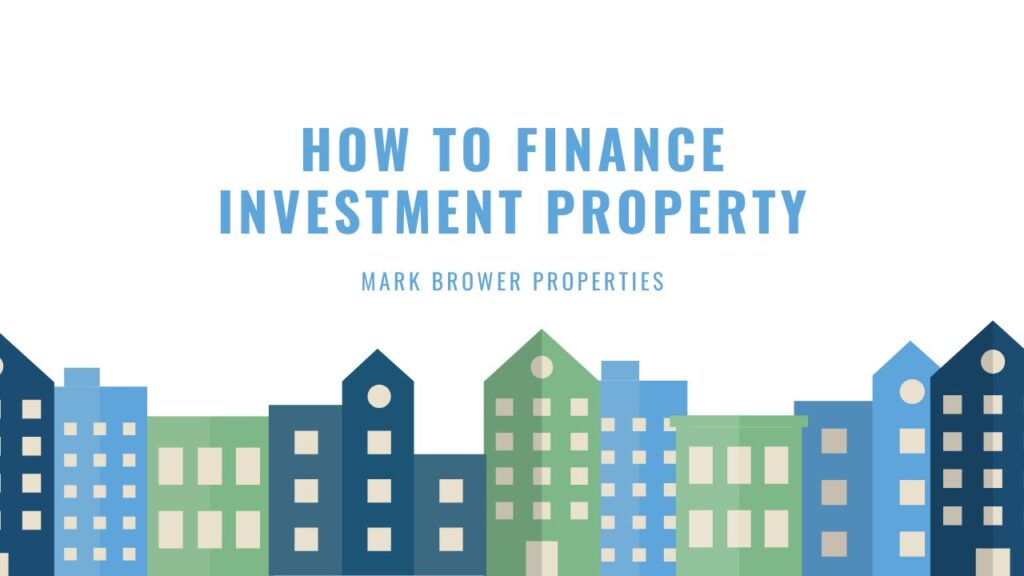
One of the most powerful strategies for building wealth through real estate with minimal risk is the use of leverage. To make the most of this approach, it’s essential to understand how to use leverage wisely, explore the various options available, and identify the one that best aligns with your financial strength, timeframe, and risk tolerance. Understanding the finance vehicles available to you can put you at an advantage in maximizing your profit margins and overall success. In this article, we’ll break down the key financing options for investment properties, helping you make informed decisions that set you up for long-term growth and stability in your rental business. 8 Essential Financing Options for Real Estate Investors Here are 8 key financing options for investment properties: 1. Conventional Mortgages Conventional mortgages are the most common financing option for investment properties. These loans are offered by banks and mortgage lenders, and they typically require a down payment of at least 20%, although some lenders may require more for investment properties compared to primary residences. Conventional mortgages offer competitive interest rates and fixed or adjustable terms, making them appealing to landlords who prioritize stable monthly payments. However, they come with stricter qualification criteria, including a good credit score, a solid debt-to-income ratio, and proof of consistent income. 2. Portfolio Loans Portfolio loans are held by the lending institution rather than being sold on the secondary market. This means that lenders have more flexibility in setting the terms and qualification requirements. They are particularly beneficial for landlords who own multiple properties or those who may not qualify for traditional loans due to a high debt-to-income ratio or non-traditional income sources. Portfolio loans can offer customized solutions, such as cross-collateralization or blanket mortgages, which allow landlords to finance multiple properties under a single loan. While the interest rates on portfolio loans may be slightly higher, their flexibility and the personalized relationship with the lender make them a valuable option for expanding property portfolios. 3. Hard Money Loans Hard money loans are short-term, asset-based loans provided by private lenders or investment groups. These loans are secured by the property itself, and the approval process is much faster than traditional loans, often taking just a few days. The downside is that hard money loans come with higher interest rates and require substantial down payments. Despite these costs, they are a viable option for landlords looking to capitalize on time-sensitive opportunities. It’s also essential to have a clear exit strategy, as hard money loans are generally due within 6 to 24 months. 4. Home Equity Loans and HELOCs Home Equity Loans and Home Equity Lines of Credit (HELOCs) allow landlords to leverage the equity built up in their existing properties to finance new investments. A Home Equity Loan provides a lump sum with a fixed interest rate, while a HELOC functions more like a credit card, offering a revolving line of credit with variable interest rates. Both options typically offer lower interest rates than conventional mortgages because they are secured by existing property equity. This makes them an attractive option for landlords who want to avoid the high down payments and interest rates of other loans. 5. FHA and VA Loans Federal Housing Administration (FHA) and Veterans Affairs (VA) loans are designed for owner-occupied properties. FHA loans are known for their low down payment requirements and more lenient credit score criteria, making them accessible for landlords looking to start their investment journey. However, the property must be your primary residence for at least a year before you can convert it into a rental. VA loans, available to veterans and active-duty military members, offer similar benefits but with no down payment required. 6. Commercial Loans Commercial loans are designed for landlords investing in multi-family or mixed-use properties and are approved based on the property’s income potential rather than just the borrower’s finances. These loans offer higher amounts and longer terms, ideal for scaling with larger investments, though they often come with higher interest rates and down payments. This approach is similar to portfolio loans, as both focus on the asset’s performance (such as cash flow and occupancy rates) rather than the borrower’s financial profile, making them advantageous for investors managing multiple properties. 7. Private Money Loans Private money loans are funded by individual or group investors seeking returns, not traditional banks. These loans offer flexible approval terms and are often negotiated directly with the lender. Although they have shorter terms and higher interest rates, they’re a useful alternative for landlords who may not qualify for conventional financing. Private money loans are similar to hard money loans in that both are typically short-term, higher-interest loans funded by private lenders, making them accessible options for investors needing flexible or rapid funding. 8. Seller Financing Seller financing, also known as owner financing, is an arrangement where the seller of a property acts as the lender and allows the buyer to make payments directly to them instead of going through a traditional bank. The seller gets a steady stream of income and potentially a higher sale price, while the buyer can secure the property without the stringent approval process of traditional loans. The terms, including down payment, interest rate, and repayment schedule, are negotiated between the buyer and seller, offering more flexibility than standard financing options. Working with a Mortgage Investor and Real Estate Agent Collaboration among a knowledgeable real estate agent, a skilled property manager, and a reliable private mortgage broker can significantly enhance the success of any real estate investment. A well-informed agent provides insights into market trends and locates properties that align with investment goals, while an experienced property manager offers strategies to maximize rental income and handle daily operations. Meanwhile, a trusted mortgage broker navigates financing options, securing the best rates and terms suited to the investor’s unique financial situation. Bottom Line Choosing the right financing strategy is crucial for maximizing your rental property investments. Whether you’re a seasoned landlord or just getting started, understanding your options can
What Exactly is “Normal Wear and Tear”?
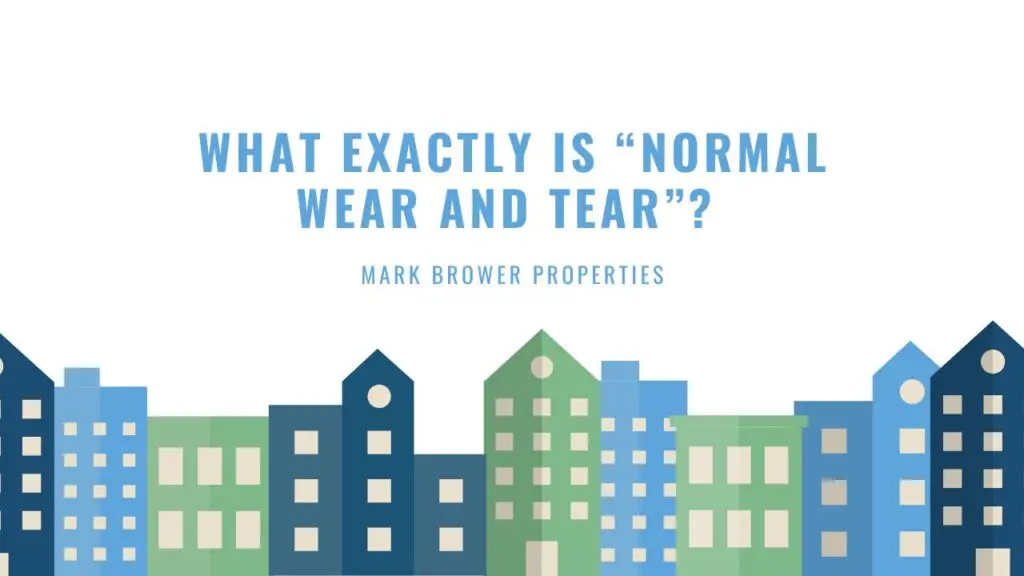
Arizona law requires that landlords pay for any repairs and maintenance that are the result of normal and wear and tear. As such, every landlord should expect to invest in the upkeep of their property and treat their tenants fairly. As a landlord, it’s important to understand the difference between everyday use and damage caused by tenants. Knowing this can save you from unnecessary disputes over security deposits, help you keep your property in great shape, and protect your reputation. In this article, we’ll provide a general break down what qualifies as normal wear and tear, and what crosses the line into excessive property damage. By understanding these key distinctions, you’ll be better equipped to handle tenant move-outs smoothly and protect your investment. Please note that this advise my vary depending on where your property is located. Wear and Tear vs. Other Types of Damages Wear and tear refers to the natural and expected deterioration of a property over time, while other types of damages are typically caused by negligence, misuse, or accidents. Here’s a more detailed breakdown of the key differences: Normal Wear and Tear This is the normal and gradual aging of a property or its fixtures due to everyday, acceptable use. Landlords a typically responsible for addressing issues relating to normal wear and tear and cannot deduct costs of said repairs from a tenant’s security deposit. General examples of normal wear and tear include: Faded paint Worn out carpets Minor scuffs on walls Loose door handles Slight discoloration in the fixtures Excessive Property Damage These are often the result of accidents, negligences, or intentional actions that go beyond the normal use of the property. Landlords can use the tenant’s security deposit to cover costs that result from things like destroyed, defaced, damaged, impaired, or stolen items in and around the property. Specific examples of excessive property damage include: Large holes in the wall Large stains on carpets Chipped or cracked counters and tiles Missing and/or damaged fixtures Understanding the difference between these two is important when it comes to evaluating a rental property at the end of a lease and determining the appropriate responsibility for repairs and security deposit deductions. Note that even in instances of obvious tenant damage, you won’t likely be able to charge the full amount for repairs. This is because of depreciated value. As such you can only change based on the depreciated value of the item when making deductions from the tenant’s security deposit. When can be Charged from the Tenant’s Security Deposits at Move-Out? When making deductions from a tenant’s security deposit you must ensure that you follow the law. The penalty for failing to do so is being changed 3X the original deposit. The key, legally compliant reasons a landlord may make deductions from a security deposit at the end of a tenancy include: Unpaid Rent or Utilities If a tenant moves the rental property without paying all rent or utility bills owed, the landlord can use part or all of the security deposit to cover these outstanding amounts. Cleaning Costs Landlords may charge tenants for cleaning costs if the property is left in an unusually dirty or unsanitary condition. However, general cleaning, like vacuuming or wiping down surfaces, should not be charged. The deposit can be used if deep cleaning is required, such as removing excessive grime, stains, or odor. Failure to Return Keys or Items If a tenant fails to return keys or other provided items, such as garage door openers, this can result in charges to replace them. Breach of Lease If a tenant violates the lease agreement, such as moving out before the lease ends without proper notice, landlords may deduct from the deposit to cover losses, including costs related to finding a new tenant. As a landlord, it’s best to consult with a property management company or attorney knowledgeable on local security deposit laws before making deductions. This will protect your real estate investment ensure a smooth transition between tenants and help keep you out of court. Tracking Damage With Before and After Photos and Videos Taking before and after photos and videos of your rental property is a simple and effective way to track damage. Before the tenant moves in, take clear, time-stamped photos of every room, including walls, floors, and appliances. Focus on areas that are likely to show wear, like kitchens, bathrooms, and high-traffic spots. When the tenant moves out, take photos and videos again in the same locations. These “before” and “after” pictures and videos will show if any damage has occurred beyond normal wear and tear. Having this form of documentation can protect you if there’s a dispute over the security deposit, as they provide clear evidence of the property’s condition. Keep your evidence organized and stored safely so you can easily access them when needed. This simple step can save you time, money, and stress when managing your rental property. Preventing Property Damage with Thorough Tenant Screening To effectively minimize property damage, thorough tenant screening is essential for landlords. Begin by evaluating a prospective tenant’s rental history and reaching out to previous landlords to identify any past issues related to property care or maintenance. Furthermore, conducting a credit check provides insight into the tenant’s financial responsibility, while a background check can uncover potential red flags. Applying consistent screening criteria not only helps ensure a fair and unbiased evaluation process. By carefully selecting tenants, residential landlords can significantly reduce the risk of property damage and preserve the long-term value of their investment. Finally, once you’ve secured a promising tenant, make sure to nurture the professional relationship. respond their their calls and requests in a timely manner and demonstrate that you care about their comfort and safety. When tenants feel appreciated, they’re more likely to properly care for their rental. Bottom Line Understanding the difference between normal wear and tear and actual damage is key to maintaining your rental property and avoiding disputes with tenants. By recognizing what’s reasonable wear
Quick Guide to Effective Tenant Screening in Arizona
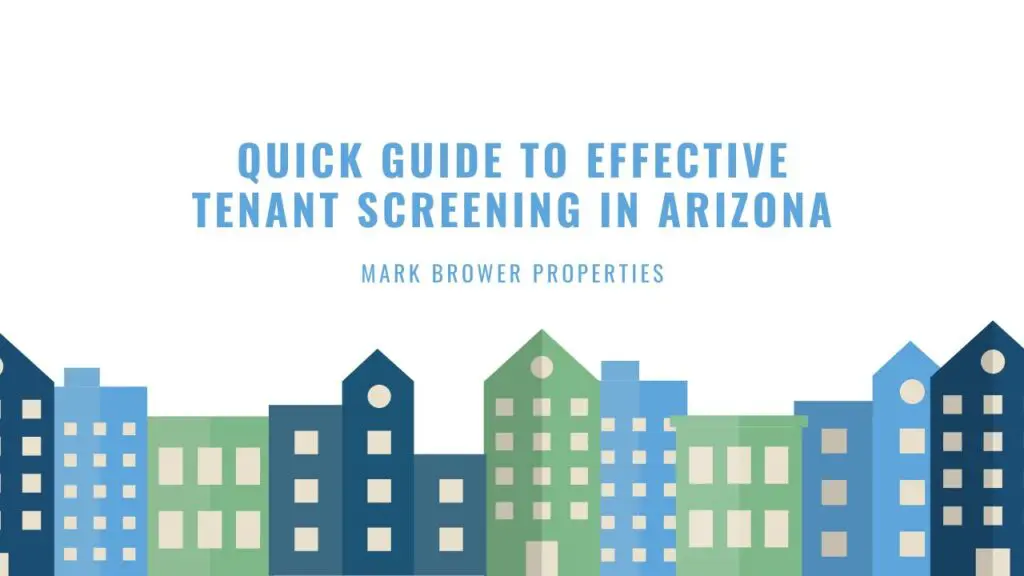
After employing effective marketing practices, you should have leads coming in for your available rental properties. The next step for landlords is to turn their attention to screening tenants. No matter how great potential residents seem, you still need to conduct a proper evaluation. The Screening Process: How to Screen Prospective Renters Tenant screening is a procedure you need to undertake to ensure that the candidate fits your criteria. You need to decide on your minimum criteria before conducting a screening. Think about what you expect from your renters. To identify the good prospects, check these factors: Can the tenant afford the rent and have a stable job? Do they have a clean credit and criminal history? Do they have a good rental history? Establish a Resident Select Criteria Make sure to have very detailed resident selection criteria in place to facilitate the tenant screening process. This ensures that before people come to look at the properties you’ve listed, they know whether or not they meet the baseline selection criteria. The value of doing so is that it can provide you with cues for future issues. This can save you time and effort down the line. Reviewing a Rental Application Landlords want to make sure bias doesn’t enter into their decision-making. For a more in-depth and fair assessment, you must create a rental application form that provides you with the following information: Contact information of the candidate Current candidate’s residential address Authorization for credit and background checking The current landlord’s name and contact info Former residential rental history with the landlords’ names and contact info Current and former employers Salary, job title, and period of employment Learning how much a candidate earns is crucial since you can deduce if they can meet the monthly rent requirements. A common rule of thumb is for renters to make at least triple the rental fee but this is not required. You must also ensure that this entire process is aligned with the Fair Housing laws. To do this, it’s best to apply an identical application and review process for all applicants. Consider hiring a trusted property management company with reliable screening software to handle this on your behalf. Verifying a Tenant’s Income and Employment You should verify the employment of a prospective renter to ensure that the income figure they shared is accurate. Some may falsify their data to get accepted as a renter. In some cases, candidates may even involve their family and friends in deception by requesting them to pose as former landlords. As such, make sure that the information from their references should match what they’ve indicated on their application. This can also be done through a property management company’s automated screening software. Connecting with Former Landlords Although it will take a bit of time, you can connect with the former and present landlord of the potential tenants. The aim is to get a well-rounded image of the candidate. Note that the current landlord may not tell the whole truth if they hope to remove the renter from their rental unit. This is why it’s important to also speak with previous residential landlords. You will want to find out if a tenant candidate contributed to property damage, caused neighborhood disturbance, or was delinquent in paying the monthly rent before deciding to accept them in your rental unit. Evaluating Tenant Credit Reports and Background Checks Credit and background checking focus on a tenant’s: Complete account history Prior evictions history Credit rating Relevant criminal history Learning the credit details of your rental candidates will reveal how financially responsible they are. That said, there are no hard and fast rules in assessing credit so landlords must be prudent and use their judgment. Be on the lookout for outstanding debt and eviction records, rather than focusing solely on the credit score itself. Accepting or Denying Potential Renters After performing the steps above, you need to decide whether to approve or reject the candidate’s application. When turning down an application for renting your unit, it’s vital to document it in writing or via email. You need this to support your decision to decline the prospective renter’s application. It might feel harsh to deny an application, especially for new landlords but it’s best to do it directly. You won’t be required to list down the reasons behind your decision to turn down a renter unless a renter specifically requested it. If you accept a tenant, contact them by calling or sending an email. Within the first few days, have then sign a preliminary agreement and have then come in with certified funds as an earnest deposit so secure their interest in the property. If this is done, let them know what the next procedure will be, which is typically lease signing and conducting a move-in inspection. Make sure to study the Fair Housing laws to ensure that at no point during the screening process did you discriminate against renters based on protected classes. As long as an application is accepted or rejected based on the prospect’s rental history, credit score or background check results you shouldn’t have anything to worry about. Bottom Line While a tenant screening procedure can be a little time-consuming, it can lead to many benefits. Good tenants provide a consistent passive income and protect your rental property, which ultimately helps you maximize your return on investment. If you are a property investor who wants to focus more on other opportunities that lead to the growth of your property portfolio, you can engage the full suite of property management services of Mark Brower Properties. We can deploy successful advertising campaigns and provide time-tested solutions that effectively find, screen, rent to, and retain high-quality residents. Contact us today to learn more!
How to Attract Long-Term Tenants
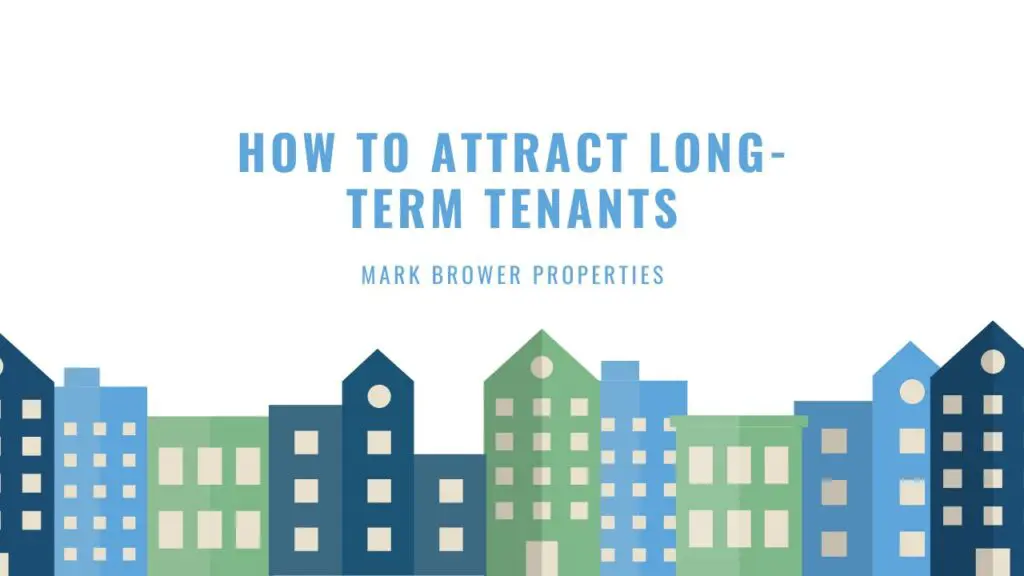
Attracting long-term tenants is vital for protecting your real estate investment and maximizing its returns. This is because long-term tenancies help avoid losses in vacancy and turnover costs and provide a steady source of monthly income. Here are effective ways of attracting renters to reside in your rental for the long haul: Invest in Your Rental Marketing Process Investing in rental properties to attract high-quality residents is key, as they present the lowest risk. These financially responsible tenants seek premium properties at competitive rates. To appeal to these discerning renters, it’s essential to offer a property that stands out in the market for its quality. To draw these tenants in, showcase excellent images and a descriptive ad copy. Your goal with all your marketing materials is to motivate your prospective renters to contact you for more information and to book a showing. When prospective tenants tour the property, make sure the space is clean and properly staged. Don’t forget to address the property’s curb appeal as this will be the first thing tenants see. You also want to make sure that booking property tours and getting in contact with you for more information is easy. Landlords should also check their ad distribution methods and make sure to balance marketing efforts between online and offline spaces. Doing so allows you to increase exposure by advertising your property on different channels. Wisely Renovate Your Rental Unit You should try to adopt a more long-term view by investing in property renovations. The more wisely you invest in upgrades, the more inquiries you get from prospective long-term renters Depending on the upgrades may also be able to place your rental on par with newly constructed rental spaces, making your rental business more competitive in the market. It’s important, however, to ensure that your upgrades will garner a solid return on investment. As such only invest in upgrades that will result in more income either from rent or the sale of the property. Place More Effort into Tenant Screening Screening tenants is vital to prevent unqualified renters from occupying your rental home. It also helps you feel more confident that you’re selecting a tenant who can pay rent consistently, care for the property, and adhere to lease terms. Landlords must check for these vital factors when screening prospective renters: Credit Score Note whether or not the renter has healthy finances. An excellent credit score informs you that the candidate meets financial obligations and is considered less risky. Level of Income You need to request that potential tenants submit W-2s, personal and business tax returns, or pay stubs to assess their income. If their earnings are low then they might find it challenging to meet the monthly rental demands, which raises the risk of signing them as residents. Generally, you want your tenants to earn 3X the monthly rental rates. Rental History You need to access more information and contacting previous landlords can help you ascertain whether the candidate is suitable to stay in your unit. Find out if they were reported for disturbance and how they resolved issues in case they committed property damage. Background Checks You need to request permission to perform a background on prospective tenants. This will provide you with essential information that will help you make a more informed decision regarding your candidacy. Adopt and Win-Win Mentality Moving into a new residential rental property is a big change. As such, it’s important to facilitate a peaceful transition into the new property. After all, when tenants self-interest aligns with that of the landlord, tenancies will go more smoothly. As a landlord, you can offer support by: Warmly welcome your renters on the day they move in Provide a clean and well-maintained property Addressing their needs promptly and consistently Teaching them how to use different home systems Maintain Your Property Well Schedule regular property inspections to ensure that all home systems are functioning properly. Catching potential issues early can help prevent costly and stressful repairs down the line. These inspections also offer valuable insights to landlords about how well tenants are maintaining the property. Additionally, it’s important to remember that state laws mandate landlords to provide safe and livable conditions for their tenants. To be prepared for any property emergencies, always keep a list of trusted repair professionals on hand. Boost the Security in Your Rental Home Everyone wants to feel safe and to convince your renters to stay for a long time, you should offer quality home security. Consider investing in reliable security alarm systems and installing motion sensor lights and surveillance cameras. Your doors and windows must also be impenetrable for the safety of your residents. Routine checkups and testing of security systems are critical to ensure their functionality. Hire a Trusted Property Manager Engaging the services of a reputable property management company is an excellent option for busy landlords. You can access a professional team who will help you advertise your property, screen renters, collect the rent, maintain and repair your rental space, and craft your lease agreements. You can also be reassured that your tenants are managed well given that the company will apply the best practices. Bottom Line Attracting long-term tenants doesn’t have to be a difficult task if you implement the right strategies. A key factor in tenant retention is creating an environment where tenants feel both safe and valued. This can be achieved through prompt responses to tenant concerns and a clear communication system. Providing a clean, well-maintained property with modern features can also make a lasting impression while fostering a sense of community and encouraging them to make your rental their long-term home. If you’re looking for expert assistance in managing your property and attracting high-quality, long-term tenants, Mark Browser Properties has the experience and reputation to help. Contact us today to learn more about our services and how we can help your rental thrive!
How to Keep Renters Happy
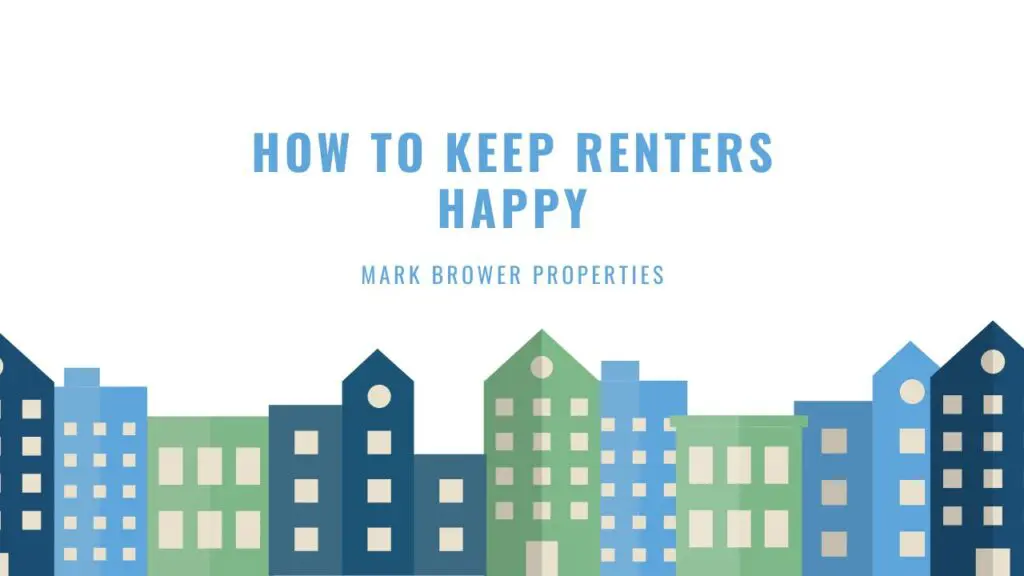
A key factor in the success of your rental business is ensuring resident satisfaction. In fact, keeping residents happy is one of the most overlooked opportunities in property management. Your residents should be viewed as partners and advocates for the proper care of the property. They’re also more likely to stay long-term, accept rent increases, communicate openly, and care for the property. Additionally, residents who get along well with others tend to create a harmonious living environment, reducing conflicts and making your property easier to manage. To retain quality residents for the long term, focus on maintaining your rental property and fostering a positive living experience. By doing so, you not only protect your property but also secure a steady income. Read on to discover effective strategies for keeping renters happy and satisfied over time. Reasons Why It Pays to Satisfy Residents When your tenants move out often, you can dedicate the bulk of your time to creating ads and preparing your unit for property showings. This also means spending some time screening candidates. Retaining the best renters in your rental property is much more cost-effective. With the presence of excellent residents, landlords experience: Stable rental income More open communication Longer-term leases Strategies to Keep Residents For the Long Term Happy residents become more loyal in the long run. You need to value your tenants by prioritizing their satisfaction. Check out the following tips to create happy residents: Attend to Property Maintenance When a renter contacts you regarding a maintenance issue, it is essential to prioritize the request and troubleshoot the issue. Maintaining the habitability of your rental unit is crucial, as your business revolves around providing clean and comfortable living environments. Provide residents with an option to conduct a self-guided inspection. Using this method allows residents to conduct a thorough inspection on their own schedule without needing someone else in their rented property. This approach also helps reduce the likelihood of tenants needing to report issues and allows you to identify and address potential problems early on. Additionally, renters considering lease renewal often assess your responsiveness to repairs and how efficiently you resolve recurring issues, making timely property maintenance a key factor in tenant retention. Be Interested in Being a Good Landlord Another crucial factor in encouraging residents to remain in your property is fostering positive landlord-tenant relationships. Tenants often prefer landlords who are approachable and responsive, as this facilitates easier communication regarding any issues they might encounter. To cultivate strong relationships, it is vital to be readily available 24/7 and responsive to your renters’ needs. When a tenant reaches out, ensure you promptly answer or return their calls and respond to messages on time. Address any misunderstandings swiftly to prevent potential conflicts and always respect your tenants’ privacy. Regardless of how long a tenant has been with you, maintain politeness and fairness in all interactions. Consistent and equal treatment of all renters is essential for building trust and encouraging long-term tenancy. Additionally, checking in from time to time to ensure tenant satisfaction and actively seeking feedback can further enhance your relationship and demonstrate your commitment to their well-being. Research Value-Adding Features Before planning your property upgrades, it is essential to speak with a real estate professional to understand which features will add the most value for your residents. Key features that often enhance property appeal include: New and durable flooring Freshly painted interior and exterior Well-maintained outdoor areas Newly renovated bathrooms and kitchen In addition to these features, consider incorporating modern upgrades such as energy-efficient appliances, smart home technology, and high-speed internet access to stay competitive. That said, whatever features you add, make sure that they lead to an increase in your return on investment. This means the upgraded features should result in reduced turnover and vacancy accosted costs and increased rent prices. Be Proactive Before a tenancy concludes, landlords should initiate contact with their tenants. A lease renewal period of 30 days is legally mandated for inquiring about the tenant’s interest in renewing the lease. That said, a 60-day notice is better as it provides more time to consider the tenant’s payment history, work notice history, and general attitude. Early communication also allows both parties to adequately prepare; landlords can begin advertising the property in advance if a tenant decides to relocate, thereby maintaining stable rental income. You should also make sure to have a contingency plan if the tenant takes no action during the renewal period. Maintaining an appropriate rent price can also incentivize tenants to renew their leases. If residents express reluctance, reach out to understand their concerns and determine what adjustments or improvements might encourage them to stay. Open dialogue enables landlords to respond to tenant preferences and make necessary adjustments. Go for Longer Leases An effective strategy is to encourage residents to commit to longer lease terms by offering discounts on rental fees. For example, if lease agreements are currently renewed every twelve months, consider transitioning to annual renewals, or if they are renewed annually, consider extending to a two-year term. While providing a rent discount or waiver may initially reduce profits, adopting this long-term approach can result in consistent rental income over an extended period. Additionally, minimizing vacancies helps to avoid the time and expense associated with frequent tenant turnover. Bottom Line A major factor in succeeding in your rental business is delivering happiness to your residents. If you require more support in this area, you also have the option of hiring Mark Brower Properties for professional resident and property management. Contact us today to learn more!
5 Best Renovations for Your Rental Property
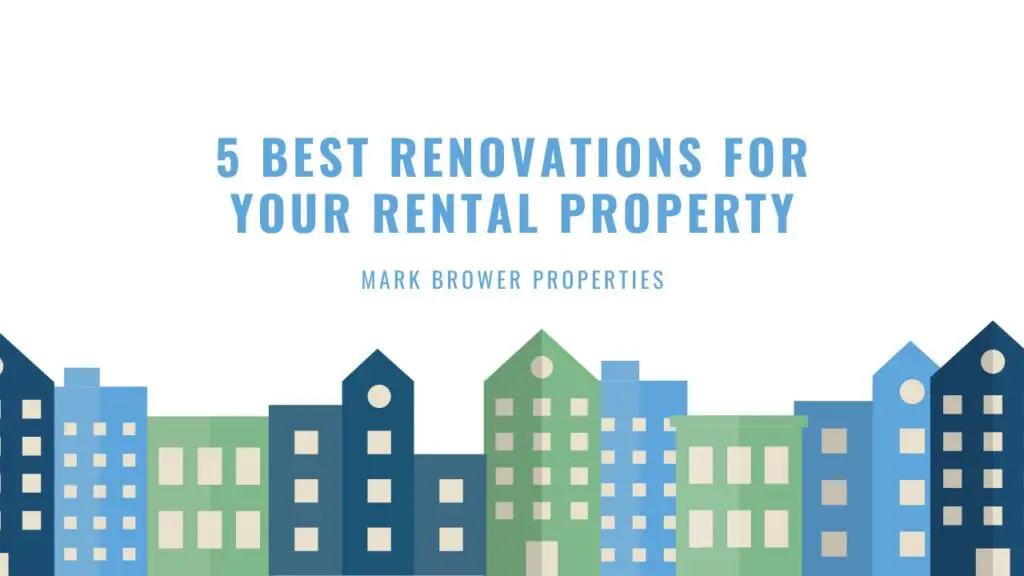
An excellent strategy to avoid vacancies and protect your property’s values is to keep improving your rental to make it a livable and comfortable space for tenants. Invest in top-tier features that align with the needs of the renters so they continue to choose your property over your competitors. Residents are more likely to schedule property tours and sign leases for properties with excellent curb appeal and flawless interiors. As such by considering what tenants are looking for, you stand a better chance of attracting loyal, quality residents. This guide will cover some of the best renovations rental property owners can make to help their property stand out from the competition. Ideal Rental Property Improvements and Renovations Consider the following property improvements: 1. Address Your Rental’s Curb Appeal You may think that the exterior of your property is less important than the interior. However, your property’s curb appeal is the first thing prospective tenants will see when conducting property tours. Potential renters will be more interested in residing in a property that has an impressive and well-maintained exterior. You can improve your property’s curb appeal by: Adding small, easy-to-maintain plants Keeping the outside clutter-free Storing the garden equipment in proper places Painting the front doors, fences, and mailboxes Maintaining your outdoor furniture Trimming weeds and overgrown branches Installing outdoor lighting to safety and aesthetics 2. Deep Cleaning the Interior Investing in a quality deep cleaning of your rental property before marketing it is essential for attracting tenants and maximizing rental income. A meticulously cleaned property creates a strong first impression, showing prospective tenants that the space is well-maintained and ready for move-in. It enhances the property’s appeal, making it easier to showcase in listings and during showings. Additionally, a deep cleaning can allow property owners to uncover and address potential issues, such as hidden damages or maintenance needs, ensuring that your property is in optimal condition. This proactive step not only protects your investment but also sets the stage for a positive rental experience. 3. Painting and Replacing Outdated Fixtures Wear and tear is natural after a certain time. This is why landlords need to perform regular upgrades to remain competitive in the rental business. Landlords should specifically invest in high-quality neutral paints, lighting fixtures, and fixtures because these elements significantly enhance the overall appeal and functionality of the rental property. Neutral paint colors create a versatile and inviting backdrop that appeals to a broad range of tenants, making the space feel fresh and move-in ready. Upgrading lighting fixtures not only improves the property’s aesthetics but also ensures better illumination, creating a warm and welcoming environment. These relatively small investments can lead to higher rent rates and longer-lasting tenant satisfaction, ultimately increasing the property’s long-term value. Furthermore, simple updates on blinds, carpets, and decors can enhance the appeal of your rental unit. Ultimately, you don’t have to spend too much on upgrades. Sometimes, small upgrades can make a property more cozy for the occupants. 4. Investing in High-Quality Materials Even if we offered affordable upgrades above, property investors must also budget for features that create better value for the renters. Investing in high-quality egg-shell white paint on your walls can make it easier to clean smudges and reduce the need to repaint surfaces. What’s more, high-quality carpeting that’s easy to clean can also mean longer periods between total replacements. You should also be proactive when investing in plumbing upgrades and maintenance. Don’t wait for your pipes, appliances, valves, and water heaters to fail, replace them before you’re faced with leaks and flooding. Better quality materials provide more benefits to the renters. They can reduce repairs, make it easy for residents to maintain, and can withstand more potential damage. Even if considered costly, these materials will likely offer a solid return on investment. 5. Creating an Open Floor Plan No one likes staying in cramped spaces. If you have several unused rooms, plan to expand the other areas of the property by combining rooms and opening up more spaces. You can knock down a couple of walls so the room appears brighter and feels refreshing for the residents. This task should be handled by professionals though since a project of this scale requires permits and an understanding of building codes. Purpose of Property Renovations and Improvements Renovating your property engages more interest from prospects, builds value, and makes your rental space more unique in a competitive market. It also leads to lower vacancies, more savings on property marketing, and better tenant relations. Furthermore, you’re more likely to end up with happy tenants seeking to renew the lease agreements and stay for the long term. Here are some reasons property investors should renovate their rentals: Property Differentiation – You want to stand out among similar property rentals in your area and renovating your unit is a great strategy to achieve this mission. Higher Resale Value – If you’re looking to sell your real estate investment, you can set a competitive price since you have taken the time to upgrade various features and create more value for your property. More Rent – If you’re offering better home features and newly renovated interior and exterior spaces, you could potentially justify higher rent prices, thus maximizing your ROI. Bottom Line Successful property investors don’t stop improving their investment properties to add more value, satisfy residents, and maintain their units for the long term. If you are looking for a reliable partner that can support property renovations, screen renters in detail, market a vacant rental space quickly, collect the rent on time, and conduct regular property inspections, get in touch with Mark Brower Properties today!


